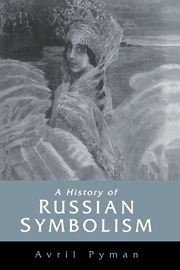Book contents
- Frontmatter
- Contents
- Preface
- Acknowledgements
- Note on the text and list of abbreviations
- Prologue: decadence or rebirth? The European fin de siècle and the Russian precursors
- Part 1 The art of the cell
- Part 2 Collective creation
- 4 The foundation of Mir Iskusstva and the role of the visual and performing arts. Benois, Diagilev, Filosofov and their group (1890–1904)
- 5 From Mir Iskusstva to Novyi Put'. The development of Merezhkovsky's prose and thought, Rozanov, Shestov (1898–1904)
- 6 Russian Symbolism comes of age. Skorpion, Severnye Tsvety and Vesy. Briusov as organiser and teacher (1900–4)
- Part 3 Gleams of paradise
- Part 4 A glittering hell
- Part 5 Our home from the beginning
- Epilogue
- Chronology
- Notes
- Bibliography
- Index
5 - From Mir Iskusstva to Novyi Put'. The development of Merezhkovsky's prose and thought, Rozanov, Shestov (1898–1904)
Published online by Cambridge University Press: 08 January 2010
- Frontmatter
- Contents
- Preface
- Acknowledgements
- Note on the text and list of abbreviations
- Prologue: decadence or rebirth? The European fin de siècle and the Russian precursors
- Part 1 The art of the cell
- Part 2 Collective creation
- 4 The foundation of Mir Iskusstva and the role of the visual and performing arts. Benois, Diagilev, Filosofov and their group (1890–1904)
- 5 From Mir Iskusstva to Novyi Put'. The development of Merezhkovsky's prose and thought, Rozanov, Shestov (1898–1904)
- 6 Russian Symbolism comes of age. Skorpion, Severnye Tsvety and Vesy. Briusov as organiser and teacher (1900–4)
- Part 3 Gleams of paradise
- Part 4 A glittering hell
- Part 5 Our home from the beginning
- Epilogue
- Chronology
- Notes
- Bibliography
- Index
Summary
Мечтать ли нам о повтореньях?
Иной мы жаждем высоты.
Для нас в слияньях и сплетеньях
Есть откровенья простоты.
Отдайся новым созерцаньям,
О том, что было — не грусти,
И к вере истинной — со знаньем —
Ищи бесстрашного пути.
Зинаида ГиппиусThe only point on which there had ever been true consensus among all the ‘seekers’ of the Silver Age was that the way ahead – for them at least – led through their own creative intuition, through art. To provide such a way, they further agreed, art must be absolutely free, not only of political censorship but of all set tasks and foregone conclusions. Every answer must come from the artist's own, subjective experience. For a few brief years, such freedom was granted, incongruous though it might seem, in the eclectically hospitable pages of Mir Iskusstva. Here the interests of thinkers and artists developed together, then began to diverge. It was Merezhkovsky, who, thanks perhaps in part to his own limitations as a writer, transformed what had been a multiplicity of private quests into a public enquiry and thereby focused the attention of a wider stratum of society not only on ‘the new religious consciousness’ but on ‘the new aesthetic’ as well.
Dmitrii Merezhkovsky, as is clear from his poetry, was a man still heavily trammelled by his positivist nineteenth-century upbringing, an essentially transitional author. It is typical of his religious thought, for instance, that he looked upon the ‘blindness’ of history to the life of Christ on earth as the innate inability of the man-made discipline of history to find room for the intrusion of Eternity.
- Type
- Chapter
- Information
- A History of Russian Symbolism , pp. 123 - 159Publisher: Cambridge University PressPrint publication year: 1994



